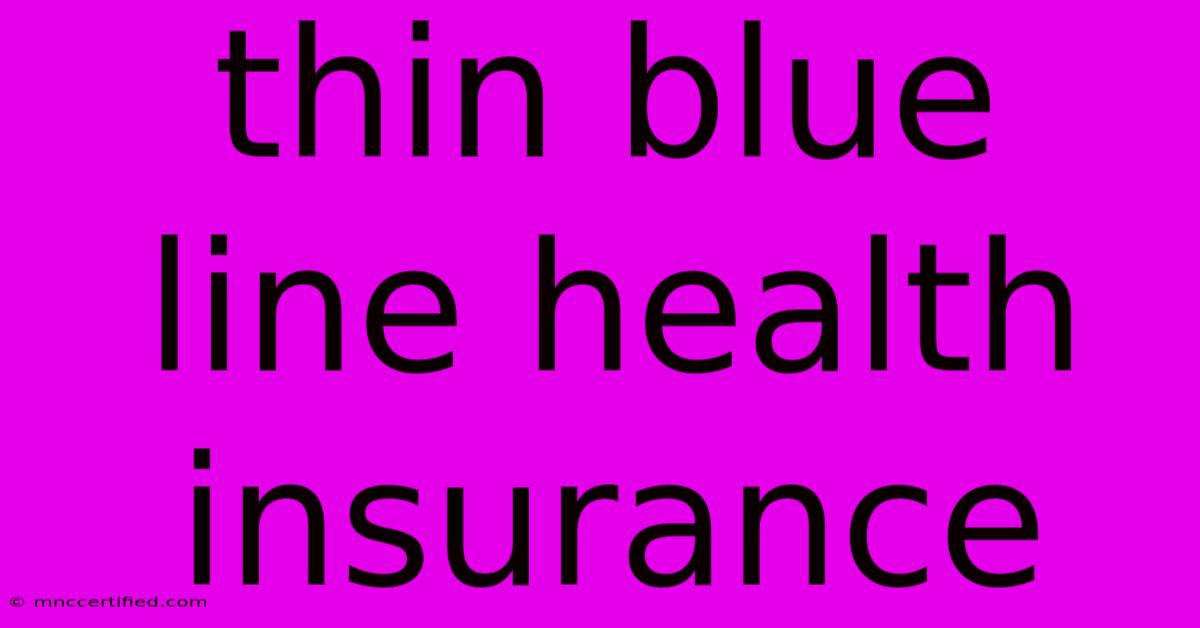Thin Blue Line Health Insurance

Table of Contents
Thin Blue Line Health Insurance: Protecting Our Protectors
The men and women in law enforcement dedicate their lives to protecting our communities. They face immense pressure, daily risks, and unique health challenges. That's why access to comprehensive and affordable health insurance is not just a benefit—it's a necessity. This article explores Thin Blue Line health insurance options, addressing common concerns and helping law enforcement officers find the best coverage for their needs.
Understanding the Unique Needs of Law Enforcement Professionals
Law enforcement officers face a higher risk of various health issues compared to the general population. These include:
- Physical Injuries: High-stress situations, physical altercations, and accidents on the job can lead to significant injuries requiring extensive medical care.
- Mental Health Challenges: The constant exposure to trauma, violence, and stressful situations can significantly impact mental well-being, leading to PTSD, anxiety, and depression.
- Shift Work & Irregular Schedules: The demanding nature of law enforcement often involves irregular hours, impacting sleep patterns and contributing to health problems.
- Exposure to Hazardous Materials: Officers may encounter hazardous substances during investigations or arrests, increasing their risk of exposure-related illnesses.
Traditional health insurance plans may not adequately address these specific needs. That's why specialized Thin Blue Line health insurance options have emerged, offering tailored coverage and support for law enforcement professionals.
What is "Thin Blue Line" Health Insurance?
The term "Thin Blue Line" refers to the symbolic representation of law enforcement, symbolizing the protection they provide between order and chaos. While there isn't a specific insurance product called "Thin Blue Line insurance," the term is used to describe insurance plans designed specifically for law enforcement officers and their families. These plans often offer:
- Comprehensive Coverage: Including coverage for physical injuries, mental health services, and preventative care.
- Specialized Services: Access to specialized medical professionals experienced in treating law enforcement-related injuries and mental health conditions.
- Competitive Pricing: Often leveraging group rates to offer more affordable premiums.
- Supportive Resources: Access to resources such as employee assistance programs (EAPs) and wellness programs designed to address the unique challenges faced by law enforcement.
Finding the Right Thin Blue Line Health Insurance Plan
Finding the right plan requires careful consideration of several factors:
- Coverage Options: Compare plans based on deductibles, co-pays, out-of-pocket maximums, and the breadth of services covered.
- Network Providers: Ensure the plan includes a robust network of healthcare providers in your area.
- Mental Health Benefits: Look for plans with strong mental health coverage, including access to therapy, medication, and inpatient treatment if necessary.
- Prescription Drug Coverage: Review the formulary (list of covered medications) to ensure your necessary medications are included.
- Cost: Compare premiums, deductibles, and out-of-pocket costs to find a plan that fits your budget.
Resources for Law Enforcement Officers Seeking Health Insurance
Several organizations offer resources and support to help law enforcement officers find the best health insurance plans:
- Professional Associations: Many law enforcement associations offer group health insurance plans to their members.
- Employer-Sponsored Plans: If your agency offers health insurance, carefully review the plan options available.
- Independent Insurance Brokers: An independent broker can help you compare different plans and find the best fit for your needs.
Beyond Insurance: Supporting the Well-being of Law Enforcement
Access to quality health insurance is crucial, but it's only one piece of the puzzle. Supporting the overall well-being of law enforcement professionals requires a multifaceted approach:
- Mental Health Resources: Increased access to mental health services and a culture that encourages seeking help are essential.
- Peer Support Programs: Connecting officers with colleagues who understand their experiences can provide invaluable support.
- Wellness Programs: Promoting healthy lifestyles through fitness initiatives, stress management programs, and wellness education can help prevent health problems.
Conclusion:
Ensuring the health and well-being of our law enforcement officers is paramount. By understanding the unique challenges they face and exploring the available Thin Blue Line health insurance options, we can provide the support they need to protect our communities effectively. Careful research and comparison shopping are key to finding the right plan to meet individual needs and provide peace of mind. Remember to utilize the resources mentioned above to navigate this important decision.

Thank you for visiting our website wich cover about Thin Blue Line Health Insurance. We hope the information provided has been useful to you. Feel free to contact us if you have any questions or need further assistance. See you next time and dont miss to bookmark.
Featured Posts
-
Business Insurance Theft Coverage
Nov 23, 2024
-
No Mendes Mayulu For Psg Match
Nov 23, 2024
-
Arsenals Projected Lineup Nottingham Forest Match
Nov 23, 2024
-
Kcon Crypto Arena Seating Chart
Nov 23, 2024
-
Excellent Football Recent Match Review
Nov 23, 2024